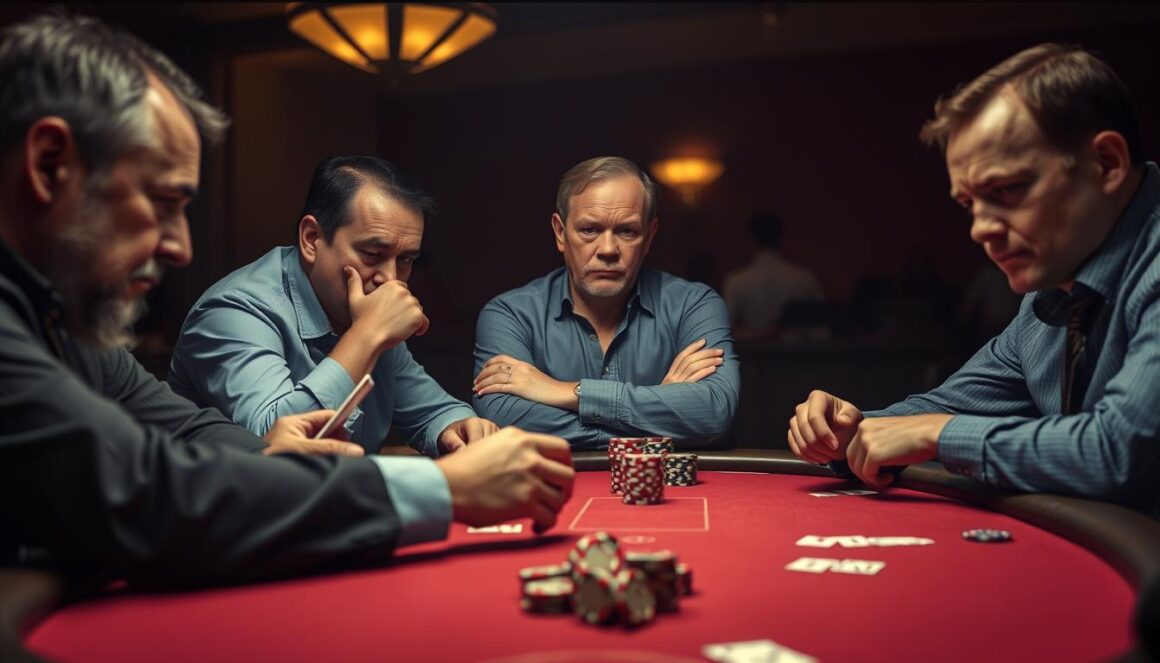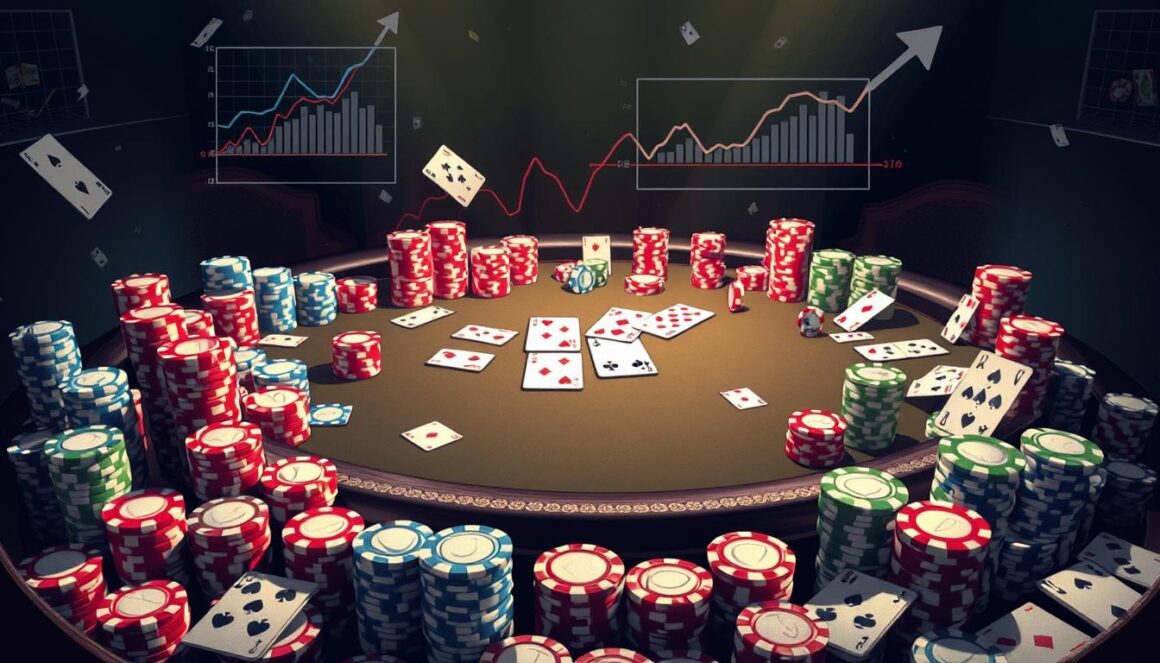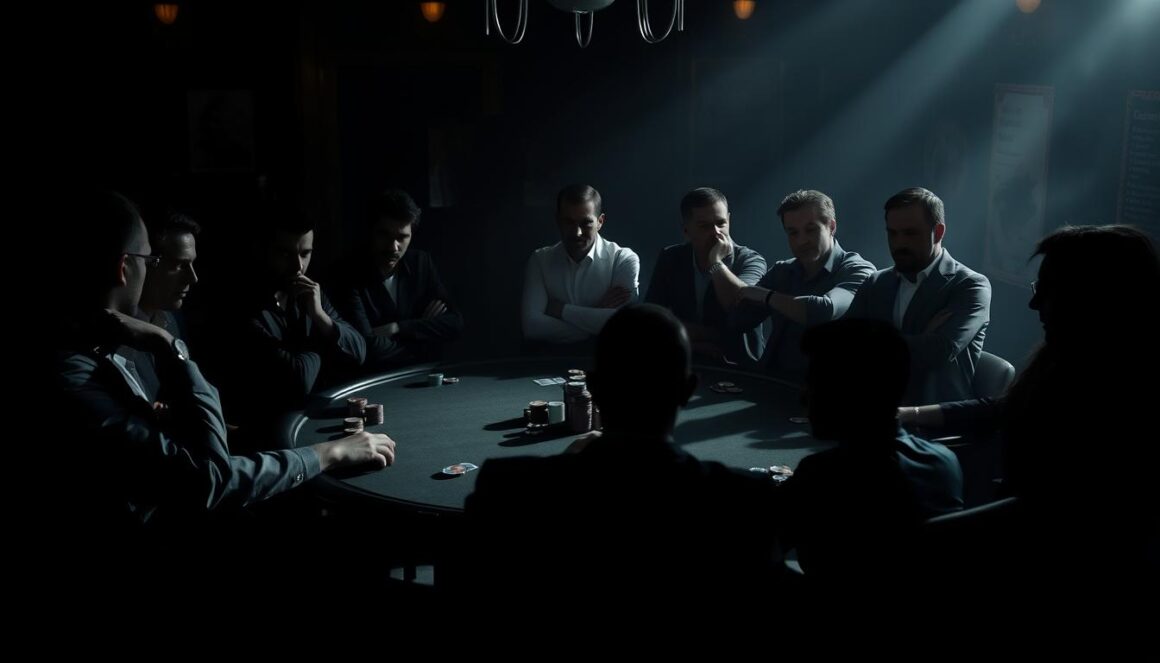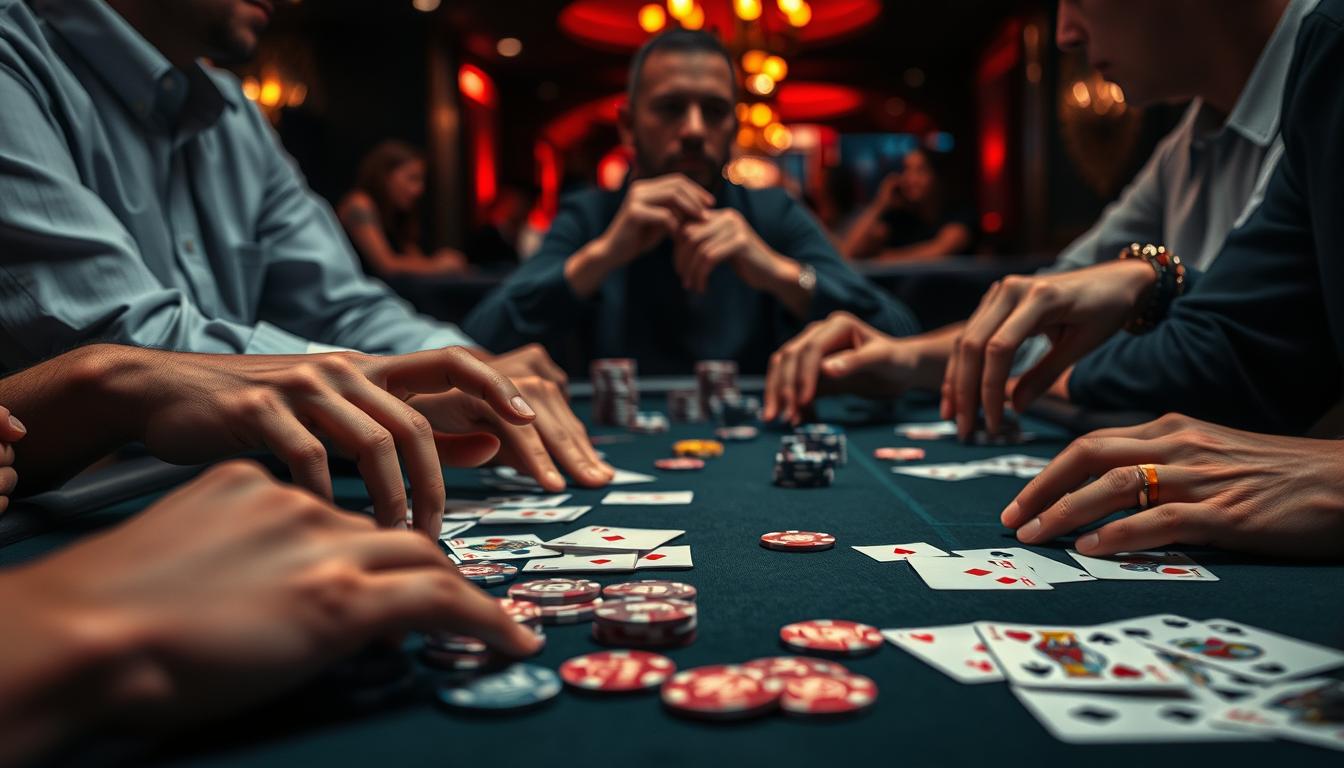Did you know that about 70-90% of what we communicate is non-verbal? In poker, this becomes a key tool for understanding players and winning. It’s all about mastering the art of reading people.
Poker is not just about cards; it’s a battle of the mind. Reading your opponents’ subtle cues can be the difference between winning and losing. To succeed, you need to observe carefully, understand emotions, and think strategically.
Top poker players know that reading tells is more than spotting a twitch or glance. It’s about deciphering a complex language of human behavior. This language reveals hidden strategies and bluffs, even before chips are bet.
Key Takeaways
- Non-verbal communication dominates poker interactions
- Emotional control significantly impacts strategic decisions
- Pattern recognition is key in player psychology
- Body language gives vital clues about opponents’ hands
- Winning at poker requires both observation and adaptability
Understanding Poker Psychology
Poker psychology is more than just the cards you get. It’s about mental strategies, controlling emotions, and analyzing player behavior. Top players know the real fight is in the mind, not just at the table.
Live poker strategy is not just about technical skills. It’s about knowing the psychological side of decision-making. Behavioral psychology shows that by observing and understanding emotional triggers, you can predict human actions.
Emotional control is key to winning at poker. Professional players know that managing feelings like tilt can greatly affect their game. Staying calm under pressure is what sets great players apart from the rest.
Players like Maria Konnikova show that mental preparation is as important as technical skill. Her work shows how understanding decision-making in high-pressure situations can change a player’s game.
Important insights include how first impressions are made fast and hand movements show more about confidence than facial expressions. To get better at poker behavior analysis, you need to practice like you would at the gym.
The best players see poker as a mental challenge. They know luck is part of it, but skill and mental toughness can boost your chances of winning. Mastering player psychology is not just about reading others—it’s about knowing yourself.
Deciphering Player Tells

Mastering poker tells is key for pros. It’s not just about watching; it’s about reading the subtle signs. These signs show what a player really thinks.
Eleven key tells can change your game. Eye contact shows confidence or nerves. How chips are moved can hide or show a bluff.
Posture, speech, and timing give away a lot. A relaxed player might have a strong hand. Quick bets show confidence, while slow bets might mean doubt.
Being “on tilt” is another tell. Irritation can make a player predictable. Studies say 60-90% of communication is non-verbal, making these signs very important.
Getting good at poker tells takes practice. While no single tell is perfect, it can give you an edge. The best players use many signs to understand their opponents.
Analyzing Betting Patterns

Poker behavior analysis shows us a lot about a player’s strategy through their bets. Skilled players know that every bet tells a story. Small bets might show weakness, while big bets often mean confidence or a bluff.
In live poker, timing is very important. Quick bets usually mean a strong hand. But hesitation might show uncertainty or a bluff. Players track how often and consistently their opponents bet.
Studies show players usually bet between 18-22% of their hands. Knowing this helps guess if an opponent bets tight or loose. Changes in betting can reveal a lot about a player’s hand or their mental state.
Position at the table greatly affects betting strategies. Aggressive players might bet on 35% or more hands from the cutoff. Watching how players bet from different positions helps understand their hand range and decision-making.
Professional poker players always watch for changes in betting patterns. They adapt to these changes to improve their game. By studying these signals, players can play more strategically and make better decisions.
The Role of Emotions

Player psychology shows that emotions play a big role in live poker strategy. The Iowa gambling task shows how emotions can lead our decisions before we even think about them. Good poker players know it’s not just about hiding feelings. It’s about using them wisely to stay at the top of their game.
Feeling excited or competitive can help, but bad emotions can be a big problem. Losing a few times can make a player’s game go downhill fast. “Tilt” – feeling angry or frustrated – can ruin even the best plans.
Top poker players get better at handling their emotions. They use tricks like visualization and anchoring to stay calm under pressure. By linking good feelings to certain moments, they can stay focused and make better choices.
Knowing about player psychology means seeing emotions as assets, not obstacles. Professional players see emotional control as a skill that helps them in many situations. Being able to read others’ emotions while keeping calm is a big plus.
Utilizing Psychological Manipulation

Poker is a game where psychological tactics can be as strong as math skills. Learning to read poker tells is key for players wanting to win. It’s not just about knowing card probabilities.
Creating a complex persona is a strategic move. It keeps opponents guessing. By controlling your expression, you send signals that affect how others see your game. This might mean showing confidence when unsure or looking weak when strong.
Building rapport with opponents through conversation is another tactic. Talking casually can weaken their defenses and reveal their mental state. Paying attention to what they say and how they act can show their strategy’s weaknesses.
For pros, emotional control is critical. Keeping a steady face and choosing when to share info can pressure opponents. You aim to make them act on emotions, not logic.
Getting good at these tricks takes time and watching others closely. Knowing how people act, spotting tells, and staying calm are key. These skills make top poker players stand out.
Recognizing Bluffing Techniques
Mastering poker tells is more than just noticing facial expressions. It’s about understanding the complex strategy of bluffing. This requires sharp observation and smart thinking.
Spotting bluffs starts with looking at betting patterns. By analyzing how opponents bet, you can spot bluffs. Pay attention to sudden changes in betting, as they often hint at a bluff.
Microexpressions can also give away a player’s true feelings. These quick facial movements can reveal a lot about a player’s intentions.
Good poker players analyze opponents thoroughly. They look at a player’s whole style, not just one moment. Signs of bluffing include sudden aggression, odd bet sizes, and inconsistent body language.
Bluffing well means being unpredictable. Successful bluffs often catch opponents off guard. They happen when the table is most uncertain.
Professional poker players spend a lot of time learning to read opponents. They see bluffing as a way to understand the game’s psychological side. By using observation, intuition, and strategy, they turn bluffing into a strong tool.
Mastering Mind Games in Poker
Poker is more than cards and chips. It’s a battle of the mind. Successful players know that strategy is not just math. It’s about reading people and managing emotions.
Mental toughness is key at the poker table. Players who control their feelings and spot tilt have an edge. Tilt happens when frustration leads to bad choices. Good players keep calm, even when things get tough.
Body language is very important in poker. Watching how others move can tell you a lot. Nervous habits or avoiding eye contact can show what they’re thinking. Big bets can mean confidence, while small bets might show weakness.
Good observation skills are essential. Winners learn to read between the lines. They understand that every action tells a story. By watching, controlling emotions, and thinking ahead, players can turn the game into a mental challenge.
Remember, poker is a game where you don’t have all the information. Your skill in reading what you can, managing your feelings, and influencing others will decide your success.
Conclusion – How to Read Anyone at the Poker Table
Learning to read people at the poker table is a mix of psychology and strategy. It’s not just about spotting tells. It’s about understanding the whole game, from body language to betting patterns. This helps you guess what your opponents might have and how they’re feeling.
Top poker players know it’s all about the details. They watch faces, track bets, and get the psychology behind each move. Daniel Negreanu says it’s not just one tell that matters. It’s about knowing everything about how your opponent plays.
The aim is to use what you see to get ahead. Keep getting better by practicing, studying, and learning from others. Remember, no single trick works forever. True skill comes from using many techniques, staying calm, and being ready to change your game.
Being a top poker player is a lifelong journey. See every hand as a chance to learn and get better. Work on your skills and insights to stand out from the crowd.
FAQ
What are poker tells and how can they help me improve my game?
Poker tells are small signs that show what an opponent might have. These can be eye movements, changes in how they sit, or how they talk. By watching these signs, you can guess what your opponents might do next. But, remember, everyone shows things differently, so it’s not always easy.
How important is emotional control in poker?
Emotional control is very important in poker. Staying calm helps you make better choices and keeps your opponents guessing. It stops you from making rash decisions and helps you play more strategically. This skill is not just for poker; it helps in many areas of life.
Can I really learn to read people’s bluffs effectively?
Learning to spot bluffs is hard and not always sure. It’s better to look at betting patterns and how they fit the hand. Even experts can only guess correctly about half the time. So, it’s best to use what you see with good poker knowledge.
What are the most important psychological skills for poker?
Key skills for poker include reading others, controlling your emotions, and understanding betting. It also helps to be empathetic and stay focused. Watching how others play and managing your own feelings are key. Being able to talk well and connect with others can also help.
How can I improve my ability to read opponents at the poker table?
To get better at reading others, watch their actions and betting closely. Look for patterns and how they react. Learning about poker psychology and practicing can help a lot. Remember, the more you play, the better you’ll get.
Are physical tells always reliable indicators of a player’s hand?
Physical tells are not always reliable. They can give clues, but you should never just rely on them. People show things differently, and some might even fake tells. It’s best to use what you see with a full understanding of the game.
Can psychological manipulation be ethical in poker?
Using psychology in poker can be okay if it’s fair and within the game’s rules. It can mean building a good relationship or showing a strategic image. But, it’s important not to cheat or make the game unfair. The goal is to play better, not to trick others.




